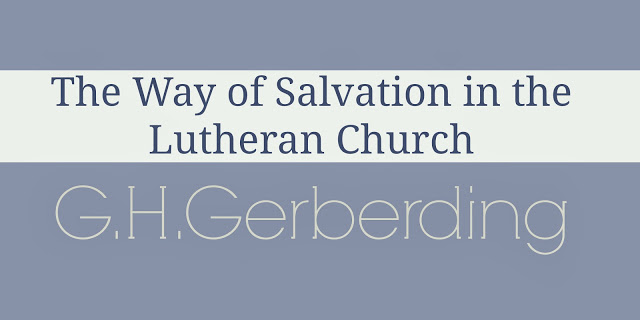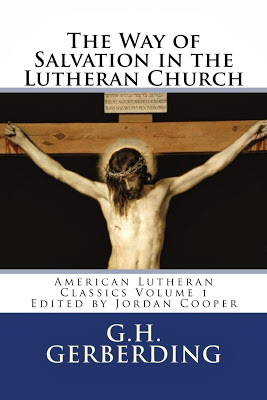If you plan on purchasing The Way of Salvation in the Lutheran Church, consider supporting Grace for Sinners by purchasing from Amazon.
9 out of 10 Stars
Author: G. H. Gerberding
Editor: Jordan Cooper
Publisher: Just and Sinner Publications
Reading Level: Easy
Jordan Cooper describes The Way as “an answer to revivalist Christianity which was slowly encroaching on Lutheran churches” (12). Gerberding does attack revivalists practices in the closing chapters of the book, but most of the book addresses these concerns by positively laying a framework for gospeling. That framework starts in the home with children. I appreciated that very much. That’s a deep concern of mine. That’s still a blind spot in evangelicalism today. You cannot gospel effectively outside of your home without starting in your home. Gerberding says,
The Church is the Bride of Christ, the institution through which Christ brings and applies this Grace to the children of men. She must begin with the child. She must reach down to the tender infant and carry the cleansing and life-giving Grace of the Redeemer even into its sin-sick soul. (18)
Also, I found The Way helpful as a primer for Lutheran theology. I’ve had more and more interactions with Lutherans over the last few months and find a lot of it helpful. Personally, I read a lot of Presbyterians, Baptists, and other Reformed types but haven’t read a single Lutheran thoroughly (outside of consulting a few of Martin Luther’s commentaries briefly). I’ve found their theology quite distinctive from anything I’m familiar with and sometimes online interaction isn’t conducive for full understanding. I want to offer some brief summaries of Lutheran theology as expressed by G. H. Gerberding. This will focus primarily on some of the difficult doctrines for an evangelical Christian. Difficult, I think, because most are not familiar with Lutheranism at all. However, we should be reading Lutheran theologians. They’ve got a lot to offer and I love their tenacity for Christ crucified.
First, Lutherans believe in an unlimited atonement. This may have been the strangest thing to me when I first began interacting with Lutherans. In all my church history courses, I don’t recall ever being informed that Lutherans held this doctrine.
Christ’s atonement alone, and in itself, never saved a soul. It removed the obstacles that were in the way of salvation, opened the way back to our Father’s house, and purchased forgiveness and salvation for us. But all this profits the sinner nothing, so long as he is not brought into that way; so long as the purchased salvation is not applied to him personally. (21; see discussion on prevenient grace 134-135)Second, Lutherans believe baptism ordinarily regenerates. Because this point is controversial in some circles, I will provide quite a few quotations for clarity.
[Read the great commissions (Matthew 28:18-20).] Here then are the Savior’s explicit instructions. The Apostles are to make disciples. This is the object of their mission. How are they to do it? By baptizing them into the name of the triune God, and teaching them to observe all Christ’s commands. This is Christ’s own appointed way of applying His Grace to sinful men, and bringing them out of a state of sin into a state of grace. And this is the Way of Salvation in the Lutheran Church. . . .One last explanation which is helpful in understanding the necessity of baptism in Lutheran theology:
We cannot separate the water from the Word. We would not dare to baptize with water without the Word. In the works of Luther, that would be “simply water, and not baptism.” Keep in mind that whatever benefits and effects we ascribe to baptism, in the further clear words of Luther’s Catechism: “It is not the water, indeed, that produces these effects, but the Word of God which accompanies and is connected with the water, and our faith which relies on the Word of God connected with the water.” (28, 29)
Why then does our Confession say baptism is necessary to salvation? It is necessary in the same sense in which it is necessary to use all of Christ’s ordinances. The necessity is ordinary, not absolute. Ordinarily Christ bestows His Grace on the child through baptism, as the means or channel through which the Holy Spirit is conferred. But when, through no fault of its own, this is not applied, He can reach the infant in some other way. As we have seen above, He is not so limited to certain means that His Grace cannot operate without them. The only thing out Church insists on in the case of a child as absolutely necessary, is the new birth. Ordinarily this is effected, by the Holy Spirit, through baptism, as the means of Grace. When the means, however, cannot be or, through no fault of the child, are not applied, the Spirit of God can effect this new birth in some other way. He is not bound to means. (34-35 see also 47)Third, Lutherans believe the body and blood is in, with, and under the Lord’s Supper. Helpful here: Lutherans do not believe in consubstantiation. The bread and the wine are still bread and wine, but beyond reason the body and the blood are in, with, and under. Gerberding says, “The bread and the wine are earthly vessels that carry the Heavenly treasures of Christ’s body and blood, even as the letters and words of Scriptures convey to the reader or hearer the Holy Spirit” (98).
Last, Lutherans believe in the necessity of conversion (119) and assurance of salvation primarily through objective means but also partly through subjective means. Based on my interaction with Lutherans, it seems the idea of assurances through anything but the objective means of baptism, the Lord’s Supper, and the word of God (a la the absolution in their liturgy) are looked down upon. However, Gerberding doesn’t seem to have the same aversion. He frequently says things like, “True, this assurance may sometimes be dimmed by doubt or under the strain of strong temptation; but as long as there is real hatred of sin and an earnest desire to rest in Christ alone, there is Grace and acceptance with Christ” (120). Or later:
Can each one then tell whether he is at present in a converted state or not? We answer unhesitatingly, Yes, to a certainty. The inquirer need only look into his heart and see how his sins affect him. Do his sins grieve him? Does he hate them? Does he earnestly long and strive to be rid of them? Does he daily turn to Jesus Christ for forgiveness and strength? If he can answer these questions in the affirmative, he has the elements and evidences of conversion and the new life . . . .
But if, on the other hand, his sins do not trouble the sinner; if they are as trifles to him; if they do not daily drive him to the Cross, the elements and evidences of the new life are certainly wanting. Such a person, is in an unconverted state. Let not such a person delude himself with the false idea that something, which he called change, had taken place at some point in the past. He can know whether he is now in the faith. . . . He whose faith, reaching up out of a heart that mourns over and hates sin, lays hold of Christ, even tremblingly, can say, “I know in whom I have believed,” “I know that my Redeemer lives.” (127-128).
Those are some of the controversial positively and negatively points of Lutheran theology as I’ve come across them. I’m better for reading The Way and have a better understanding of Lutheran theology as a result. One final point that Gerberding makes that all evangelicals and proponents of the modern style of revival should take heed:
[W]e object to the modern revival system, because it rests on an entire misconception of the coming and work of the Holy Spirit. The idea seems to be that the Holy Spirit is not effectively present in the regular and ordinary services of the sanctuary; that He came to the church as a transient guest on the day of Pentecost, then departed again, and returned when there was another season of special interest. That he left again, and ever since has come and worked with power during every revival, and then departed to be absent until the next. We claim that this is directly contrary to the teaching of the Divine Word . . . .For those looking to understand Lutheran theology especially in the American context, The Way is a must read. Also, it would helpful for evangelicals in general in balancing the abuses found in the church today. Jordan Cooper in the introduction is right when he says many of the facts and details could be slightly altered and still directly address to today’s American evangelical church.
At so-called revival seasons the church has a Comforted. During all the rest of the time she is left in a desolate and orphaned state. Thus is the revival system built up on an entire misconception and misapprehension as to the coming and abiding of the Holy Spirit. (164, 165-66).
Jordan Cooper, editor of The Way, has released two more volumes in the American Lutheran Classics series for those interested: Biblical Dogmatics: A Study of Evangelical Lutheranism (Vol. 3) by A. G. Voigt and Elements of Religion (Vol. 5) by Henry Eyster Jacobs.




No comments:
Post a Comment